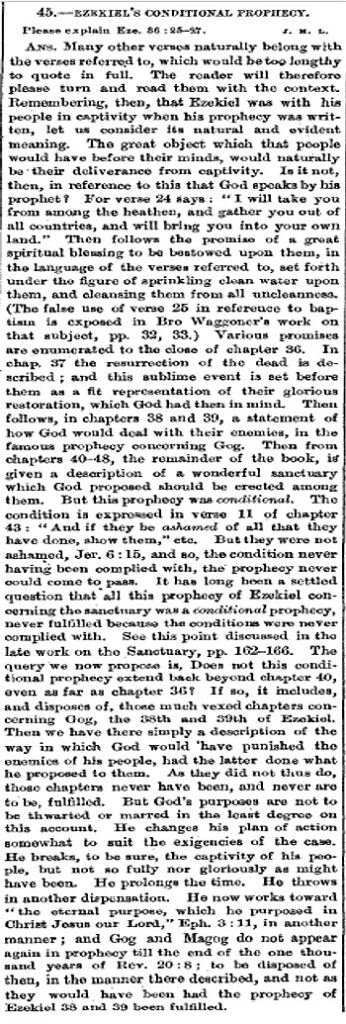Please explain Eze. 36:25-27. – J.M.L.
“Many other verses naturally belong with the verses referred to, which would be too lengthy to quote in full. The reader will therefore please turn and read them with the context. Remembering, then, that Ezekiel was with his people in captivity when his prophecy was written, let us consider its natural and evident meaning. The great object which that people would have before their minds, would naturally be their deliverance from captivity. Is it not, then, in reference to this that God speaks by his prophet? For verse 24 says: “I will take you from among the heathen, and gather you out of all countries, and will bring you into your own land.” Then follows the promise of a great spiritual blessing to be bestowed upon them, in the language of the verses referred to, set forth under the figure of sprinkling clean water upon them, and cleansing them from all uncleanness. (The false use of verse 25 in reference to baptism is exposed in Bro Waggoner’s work on that subject, pp. 32, 33.)
Various promises are enumerated to the close of chapter 36. In chap. 37 the resurrection of the dead is described; and this sublime event is set before them as a fit representation of their glorious restoration, which God had then in mind. Then follows, in chapters 38 and 39, a statement of how God would deal with their enemies, in the famous prophecy concerning Gog. Then from chapters 40-48, the remainder of the book, is given a description of a wonderful sanctuary which God proposed should be erected among them. But this prophecy was conditional. The condition is expressed in verse 11 of chapter 43 : “And if they be ashamed of all that they have done, show them,” etc. But they were not ashamed, Jer. 6:15, and so, the condition never having been complied with, the prophecy never could come to pass. It has long been a settled question that all this prophecy of Ezekiel concerning the sanctuary was a conditional prophecy, never fulfilled because the conditions were never complied with. See this point discussed in the late work on the Sanctuary, pp. 162-166. The query we now propose is, Does not this conditional prophecy extend back beyond chapter 40, even as far as chapter 36 ? If so, it includes, and disposes of, those much vexed chapters concerning Gog, the 38th and 39th of Ezekiel.
Then we have there simply a description of the way in which God would have punished the enemies of his people, had the latter done what he proposed to them. As they did not thus do, those chapters never have been, and never are to be, fulfilled. But God’s purposes are not to be thwarted or marred in the least degree on this account. He changes his plan of action somewhat to suit the exigencies of the case. He breaks, to be sure, the captivity of his people, but not so fully nor gloriously as might have been. He prolongs the time. He throws in another dispensation. He now works toward “the eternal purpose, which he purposed in Christ Jesus our Lord,” Eph. 3:11, in another manner; and Gog and Magog do not appear again in prophecy till the end of the one thousand years of Rev. 20:8; to be disposed of then, in the manner there described, and not as they would have been had the prophecy of Ezekiel 38 and 39 been fulfilled.”
Review and Herald, October 2, 1879

